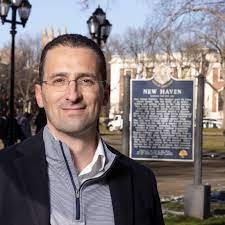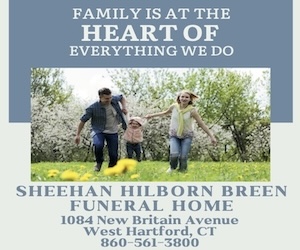
West Haven native wants to be the first Jew elected mayor of New Haven
By Stacey Dresner
Last December, Tom Goldenberg, announced that he would run for mayor of New Haven, Conn.
Goldenberg, who would be the first Jew to be elected mayor of New Haven if victorious, will run against current Mayor Justin Elicker, retired New Haven police sergeant and former alder Shafiq Abdussabur, and attorney Liam Brennan in the September Democratic primary.
Goldenberg, 41, was raised in West Haven, Conn., by his parents, Sam and MaryKay Goldenberg, both retired local public school teachers. In his website bio, he says he was “raised in a multi-faith and diverse community which gave him an appreciation for people from all walks of life” — his father is Jewish and his mother is Irish Catholic.
Long a spiritual seeker — he spent a few years in an ashram in India — Goldenberg converted to Judaism after starting a family.
While raised in the New Haven area, he has some Hartford connections — his father Sam was born and raised in Hartford. Sam’s mother Minnie Novak arrived in Ellis Island in 1921 with her family and settled in Hartford. Sam’s father Benjamin, a World War II Air Corp veteran, owned an insurance company in West Hartford, where several relatives still reside.
Before beginning his run for mayor, Tom Goldenberg was a consultant at McKinsey & Co., working with other cities and states on issues including education, housing, and economic development. He serves on the board of the Downtown Evening Soup Kitchen, and serves as a mentor for Collab, an organization that provides mentorship for minority entrepreneurs.
Goldenberg lives with his wife Dr. Jessica Holzer, chair-elect of the Public Health Department of the University of New Haven and their five-year-old daughter Ainsley in New Haven. He recently spoke to the Jewish Ledger about himself, Judaism and what he loves about New Haven.
JEWISH LEDGER: You grew up in an interfaith family. How has that informed your life and your mission to become mayor of New Haven?
I’ve had exposure to a wide array of faith traditions growing up in both a Catholic and Jewish household and being exposed to those family traditions. I also spent a number of years living in India. In my 20s I spent about nine years off and on living in South India, and really studying the faith traditions there. I certainly have found a religious home in Judaism. My family and I belong to a synagogue here in New Haven. We belong to BEKI, Beth El Keser Israel. I really enjoy being a part of that faith community and I think my experience has given me an acceptance of other faiths and ultimately, I think we are all striving for that sense of community, of helping each other and giving back to society. So that has kind of informed my embrace of other faith traditions as well.
JL: How did you actually come to find your “religious home” in Judaism?
Tom Goldenberg (TG): It really happened organically since coming back to New Haven in the last five years. My father is Jewish and I grew up celebrating Jewish holidays and customs. As I began my own spiritual journey, I was guided along the process of mikvah by Rabbi Eric Woodward, and I have embraced his teaching that mikvah does not negate one’s previous religious and spiritual experiences, but rather is like dying a cloth in the color of Judaism. As an adult, I made the decision to do mikvah and my family and I joined Beth El Keser Israel (BEKI) synagogue, a welcoming community with many young families and deep roots in New Haven
JL: Can you tell us more about your time in India on an ashram. Was it a spiritual experience for you?
TG: After studying music in college at SUNY New Paltz, I visited India to study yoga and meditation, and to volunteer with a non-government organization (NGO). The NGO I was staying with happened to be very close to the Arabian Sea, and our coastal village was devastated by the 2004 Asian Tsunami when I was there. Along with the NGO, I helped with rehabilitation efforts to build temporary shelters and distribute food and clothing. Through these experiences, I developed relationships with local villagers and became fluent in the local dialect of Malayalam. Due to my language skills, I was later asked to translate Bhagavad Gita classes for non-Malayali residents, and this blossomed into years of studying Sanskrit and then teaching Sanskrit at Amrita University in Kerala.
I carry many things from my years in India. One is the ideal of “seva,” or selfless service. It is our responsibility to each other and society to put the interests of others over our own selfish interests. This is something that informs my political activity and philosophy.
I was, and still am, inspired by many of the teachings of texts like the Bhagavad Gita. The call to self-reliance, to action performed as an act of service, and to the responsibility of each individual to do what is right are principles that strongly influence my life.
JL What made you want to go into politics, and more specifically, to run for mayor of New Haven?
TG: It’s a good question. I’ve always chased after having an impact in my life. I definitely feel the value of service. Maybe it comes from my parents and my upbringing. And so that’s been a big part of my life — having impact and really engaging myself in those kinds of things.
For the last several years I have been able to do work with other cities and state governments on things like building affordable housing, helping public education, school systems, and building strong city economies. But I think there’s something meaningful for me in being in the place where I’m from and having an impact here. I’ve been able to learn a lot in my professional career, a lot of things that I think will be very relevant as mayor. I definitely gravitate more towards the executive role than a legislative one. As a former entrepreneur and someone who has led teams, that certainly is something that I think that I would do well.
JL: You grew up in the New Haven area. What do you love most about the city?
TG: Having grown up here I definitely feel a lot of passion for the city, but also I see so much potential. I think that New Haven should be the economic engine for the state of Connecticut. And there are so many resources that we have — the location being situated between New York and Boston, being on the coast, and then all of the tremendous research that is coming out of Yale and our other institutions of higher learning.
I once heard a comparison of New Haven to Cambridge, United Kingdom. It’s an interesting comparison. So Cambridge, UK has 130,000 people, very similar to New Haven. It’s about 90 minutes from London. Similarly, we’re situated from New York City, and it has a great education institution, Cambridge University. There’s an article in the Financial Times that looks at Cambridge UK. In over 20 years they created between 50,000 and 60,000 jobs by investing in high growth industries. And I think we’ve certainly made progress in New Haven towards that but we’re nowhere near the potential that we could be. So I see a lot of potential for the city. And at the same time you look at some of the disparities we have in the city. I think you can do both at the same time— you can really invest in growth and grow our economy, while creating opportunities for these neighborhoods, where they haven’t really traditionally taken part in some of that growth.
JL: And how would you go about creating this growth?
TG: I think it’s a matter of looking at where we have a right to win. And I think there are several industries that stand out. I think Life Sciences is definitely one. I think climate technology and clean technology is another growth industry where I think New Haven should be leading and on the forefront. Then you have healthcare innovation, and tourism and entertainment or the arts. Our culinary scene is very impressive as well. So those would be the industries that I would particularly focus on.
In terms of education, I think New Haven has historically been a bit of a pioneer of urban education; it’s has been on the forefront. And what we’ve seen is a mayor who has put himself at arm’s distance for education, which many mayor’s do because it’s not something they want to take responsibility for. And we’ve slid.
And so what I would want to do is be a mayor who is hands-on with education. So I will be actively involved in policy discussions. I’ll be active in making sure that there’s rigor and accountability and transparency. Those can be translated into specific policies.
For transparency I want every school to have publicly available data from anonymous student surveys — do students feel safe? Do they feel that they’re engaged in the classroom? Currently, we don’t have any of that.
What I mean by rigor is that when we are faced with these crises of having almost 60 percent of our kids being chronically absent, we don’t go in front of our Board of Alders saying that this is all just because of COVID. We should be self-reflective and ask, ‘What are the in-school factors that we can control?’ There’s been a lot of talk about uncontrollable factors— how we can’t control COVID, we can’t control poverty. I want a discussion about what we can control, what we’re doing about it, and how we can improve it. And I have not seen that level of rigor in any of the discussions.
JL: Did growing up with two teachers as parents influence you when it comes to the subject of education?
TG: Absolutely, I really admire the work that they did. They worked with different populations of students. My dad was at ACES and worked with more severely autistic kids a little bit older, like late teenage years. My mom worked with middle school students that were having behavioral issues in the larger schools that had a special program for them. We need to support our teachers. Teachers do not get the respect, the compensation that they really deserve. And when you look at what ultimately is impacting the future of these kids, it is mostly the teachers. That’s the number one in-school factor of a student’s performance in life.







 Southern New England Jewish Ledger
Southern New England Jewish Ledger













